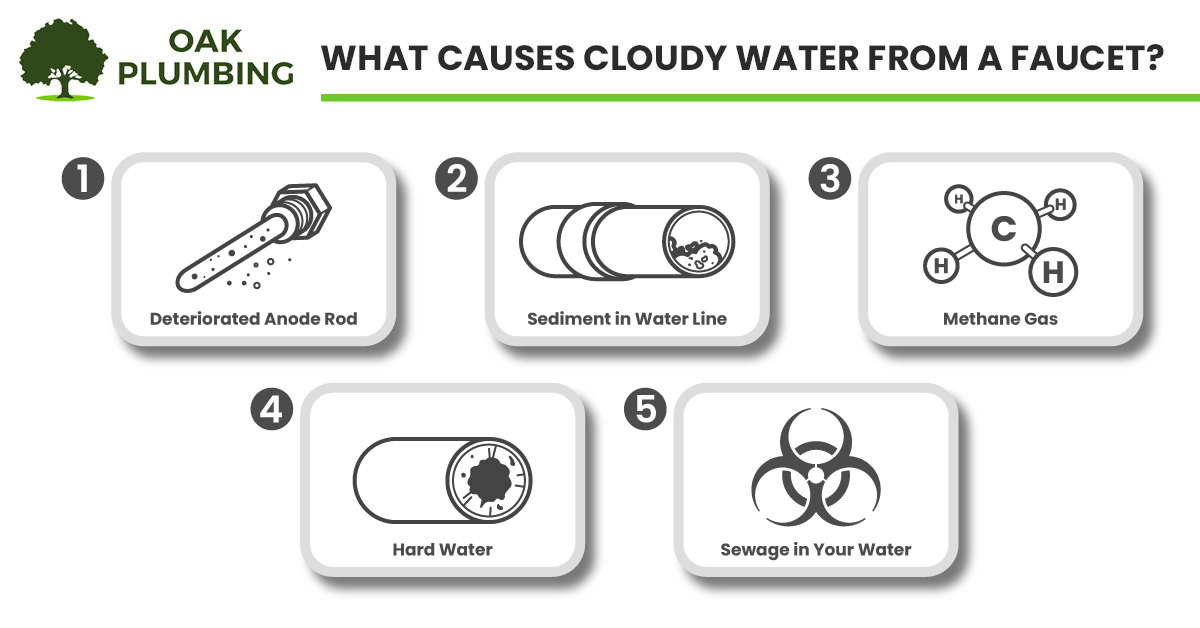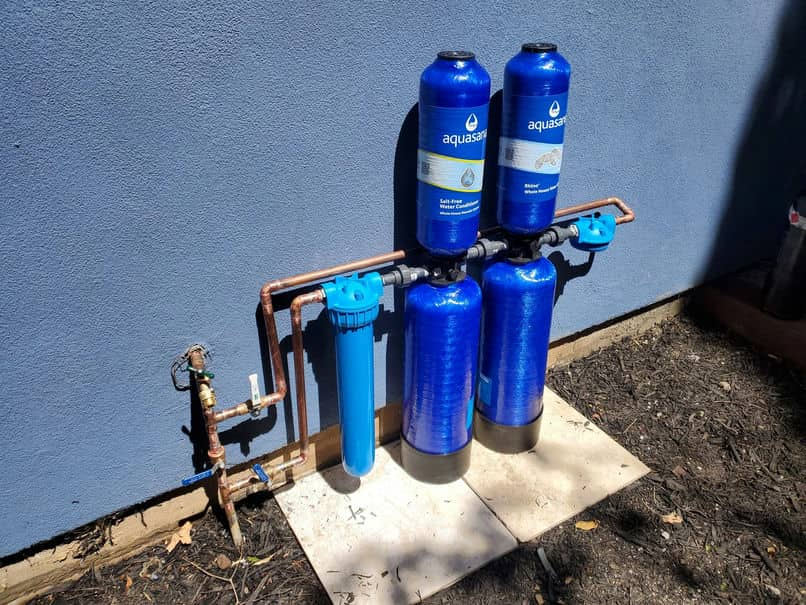Cloudy water from a faucet usually isn’t serious. However, that doesn’t mean you should throw caution to the wind and drink it because it could be contaminated. So, before you drink or use cloudy water, you need to know what’s causing the cloudy water.
We’re going to give you a quick and easy test to perform that will let you know if the cloudy water coming from your faucet is contaminated or not. We’re also going to talk about what causes cloudy water from a faucet, is cloudy water safe to drink, the best way to get rid of cloudy water from a faucet, and more.
What causes cloudy water from a faucet?
Cloudy water from a faucet due to dissolved air in the water (i.e., tiny bubbles) - created by pressure in the pipes - is common and harmless. If cloudy water is coming from your faucet, you can quickly check to see if the problem is being caused by dissolved air:
The 2-minute cloudy water test
Fill a glass with water from your tap. Next, observe the glass of water for two minutes to see what happens. If the water clears from the bottom up, the cloudiness is being caused by dissolved air in the water. Note that you might observe bubbles on the side of the glass or a small surface layer of bubbles. That’s OK as long as the cloudiness disappears in two minutes.
What if the water is still cloudy after two minutes?
If the cloudy water persists after two minutes, or you see particles in the water, or the water tastes or smells funny, the problem is not dissolved air. Something has contaminated your water. This contamination might be from any number of things, including:
- There’s a problem with your water heater related to the anode rods. Anodes rods are there to extend the life of your water heater. However, they don’t last forever and will eventually deteriorate. This can cause cloudy water.
- Your water contains sediment. This could be silt or something else. Silt won’t clear after two minutes.
- Your water contains methane gas - While this used to be a problem with well water only, today, methane gas is also found in city tap systems due to mining and aging water supply systems. Methane gas has no smell, taste, or color. However, it can make water cloudy, and methane levels over a certain level are unsafe to drink.
- Hard water - Limescale build-up in pipes can also cause cloudy water.
- There’s a small amount of sewage in your water - This is why you never want to drink cloudy water without first making sure that it’s not contaminated.
Contaminated water can make you sick. Depending on the source of the contamination, it can cause gastrointestinal problems, diarrhea, nausea, intestinal or stomach cramping, intestinal or stomach aches and pains, dehydration, or even death. Never drink water you suspect might be contaminated.
For more information see Why Is My Water Brown All of a Sudden?

Is cloudy tap water safe to drink?
It depends on why the water is cloudy. If the cloudy water is caused by air bubbles, yes, it’s safe to drink. If the cloudy water is caused by something else, it may not be safe to drink.
If you’ve already done the two-minute test for dissolved air and the water is still cloudy, you need a water quality test before you drink the water. The water quality test results will list the contaminants and allow the professional performing the test to determine which whole house water filter you need.
If you did the two-minute test and the water cleared, the problem is dissolved air. In that case…
- If the faucet already has an aerator, try cleaning it or replacing it.
- If your faucet doesn’t have an aerator, buy one. It might solve the problem.
If the cloudy, cold water is coming from one faucet only, the problem might be related to the aerator (or lack of one) in that faucet. If the cold water in all your taps is cloudy but clears in two minutes, the issue is probably related to the water supply from the municipality. Perhaps they are working on the line, causing increased pressure which increases the amount of dissolved air in the water. An increase in dissolved air can also happen if the water supplier switches to a colder water source.
For more information see Common Impurities Found in Tap Water.
What about cloudy hot water from only one faucet?
A single faucet with cloudy, hot water is usually a problem with your water heater reacting to alkaline water that’s destroying the anode rod inside the tank and the tank itself. (The anode rod is inside the tank to protect the tank from corrosive elements. However, anode rods don’t last forever, and when they reach the end of their shelf life, the corrosive elements will start eating away at the tank. Based on the type of supply line, the cloudy effect might be white, orange, or even black.) The hot water coming out of that particular faucet is cloudy because it’s closer to the water heater tank.
If you’re experiencing cloudy hot water from only one faucet, you need to ask a professional to come out and examine your water heater because metallic corrosion in the line or the water heater isn’t considered healthy.
How do I get rid of cloudy water in my faucet?
If your cloudy water is caused by dissolved air, you can try replacing your aerator. Of course, if cloudy water from your faucet is due to dissolved air, you don’t need to do anything because these tiny air bubbles don’t make the water unsafe to drink.
If the cloudy water from your faucet is being caused by contamination, a whole house water filtration system is the way to go. A whole house water filter will not only improve the quality of the water coming into your home by filtering out contaminants, but it will also prevent damage to your aerators, toilet fill valves, faucets, and more. When you use a whole house water filter, your water will taste and even feel better (strange, but true!).

While the under-the-counter point of use water filtration systems are undoubtedly useful, they only protect that one faucet. In contrast, a whole house water filter comes into your system just after your home’s main valve. In other words, the water coming into your home - including the water going into your water heater - will be filtered. With a whole house water filter, no unfiltered water will enter your home’s system.
There are various types of whole house water filters, and the type used depends on the water coming into your home. Of course, selecting the right filter will require a water quality report to determine what’s contaminating your water.
If you have cloudy water coming out of a faucet in your home and you’re in our service area in Solano, Contra Costa, Marin, Napa, or Sonoma Counties, contact us today. In most cases, we’re able to provide same-day service.

